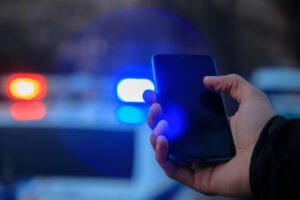
No, you cannot be arrested for filming the police in LA. In fact, it is perfectly legal to do so if you are in a public place and not interfering with law enforcement activity. In most public places, the First Amendment protects your right to record law enforcement officers performing their duties.
However, there are limits if your actions interfere with police activities or violate California law. Understanding when recording police is legal, what officers can and cannot do, and how video recordings may be used in court helps protect your constitutional rights.
Many residents rely on smartphones and social media to hold public officials accountable. A criminal defense lawyer in Los Angeles can explain the boundaries of filming police interactions and how to remain safe while doing so.
Understanding Your Fundamental Right to Film in Los Angeles
Recording the police is considered a form of free speech protected by the First Amendment. This includes filming law enforcement activity during traffic stops, public demonstrations, or when officers are responding to calls.
In Los Angeles and across Southern California, residents are generally allowed to use cell phones, body cameras, or other devices to document police interactions in public spaces. However, private property, federal buildings, and courtrooms may have restrictions.
If you think your rights have been compromised by a law enforcement officer, a police misconduct lawyer in Los Angeles can investigate the case and help protect your rights.
For a free legal consultation, call (310) 896-2723
Which Rights Are Protected by the First Amendment?
The First Amendment provides several important protections when recording law enforcement officers in LA and beyond. These rights apply in many common situations and help ensure accountability while maintaining public safety.
It is also important to understand the limits of these protections since recording does not give you the right to interfere with police duties or endanger others.
- You can record police activity in public spaces such as streets, sidewalks, and parks.
- You may document traffic stops and law enforcement activity if you do not interfere.
- Audio recording is often permitted, but rules may differ when confidential communication is involved.
- Officers cannot take your phone or delete recordings without proper legal authority.
- Backup recordings and cloud storage can help preserve evidence.
- Sharing video responsibly on social media can raise awareness while protecting your privacy.
These rights generally extend to encounters in public places, but private property owners may set their own rules, and federal buildings often have stricter regulations. By understanding these protections, you can record responsibly and reduce the risk of facing unnecessary legal problems.
When Filming Can Lead to Arrest: Navigating California’s Legal Boundaries
While recording in public is generally protected, there are moments when filming may lead to legal problems. Interfering with an investigation, entering restricted areas, or refusing lawful orders can result in detention or criminal charges.
California law recognizes the balance between constitutional rights and public safety, so individuals must film responsibly.
Understanding the following boundaries can reduce the risk of arrest while still ensuring accountability:
- Blocking officers or physically interfering with their duties
- Entering restricted zones or private property without permission
- Ignoring lawful orders to step back or create distance
- Using concealed cameras in places where privacy is expected
- Refusing to provide identification when lawfully detained
By being aware of these situations, you can better understand when filming may create legal risks and take steps to avoid arrest while still protecting your rights.
3 Key Steps to Take if You Are Arrested While Filming the Police in LA
Even though the First Amendment protects your right to record, there are situations where individuals may still be arrested. Understanding what to do if this happens can help protect your rights and strengthen your defense.
1. Stay Calm and Comply with Basic Requests
If you are detained, remain calm and avoid escalating the situation. Provide identification if requested, and follow basic instructions without arguing. Keeping your composure may reduce further complications.
2. Exercise Your Right to Remain Silent and Request an Attorney
You are not required to answer questions beyond providing identification. Clearly state that you wish to remain silent and that you want to speak with an attorney. Do not discuss details of the incident without legal counsel present.
Remember that, in Los Angeles, lying to the police is considered illegal. However, pleading your Fifth Amendment right to remain silent is permitted. A lawyer can explain the best way to interact with law enforcement in these cases.
3. Preserve Evidence and Document the Arrest
If your video evidence is deleted or confiscated, backup systems or cloud storage may still protect your recordings. After the incident, write down everything you remember, including officer names, badge numbers, witness contact information, and any nearby surveillance footage. These details can be valuable for your defense.
By following these three steps, you protect your rights and prepare a stronger foundation for addressing any charges in court.
Complete a Free Case Evaluation form now
A Criminal Defense Lawyer at Simmrin Law Group Can Protect Your Rights and Answer Your Questions
If you are accused of interfering with police activities while filming, skilled legal support can help you understand your rights and options. A criminal defense lawyer can evaluate the charges, explain California law, and guide you through the justice system.
At Simmrin Law Group, we have decades of experience defending clients. We always keep you informed. That’s the only way to ensure you understand the legal process.
If you are facing criminal charges related to filming the police in Los Angeles, do not wait to seek advice. Protecting your constitutional rights today can make a difference for your future.
Call or text (310) 896-2723 or complete a Free Case Evaluation form